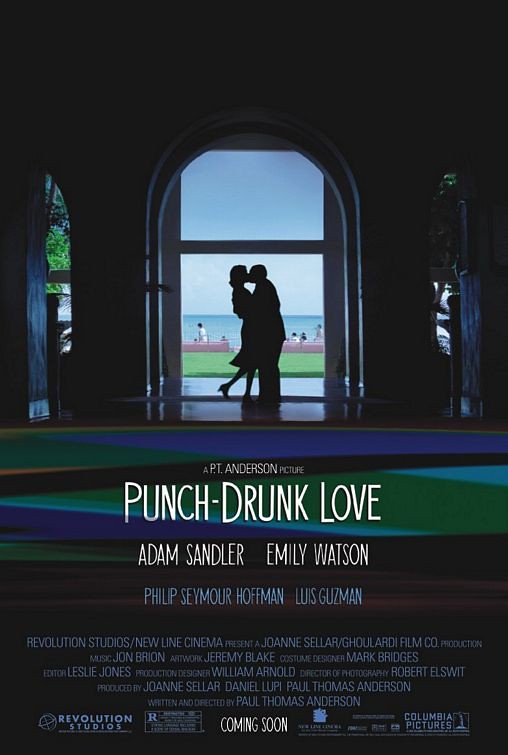
It seems fairly well accepted, at least by my circle of friends, that There Will Be Blood is the work of a master, a Great Film, and an almost faultless piece of cinema. But I look at Punch-Drunk Love and I see the same strengths and control and complicated, beautiful emotional power on display here as there. In both films we have a very, very unlikeable hero who we love despite everything, who doesn't play well with others, who runs his own business (and has one trusted employee who overlooks his proclivities), who has a more-than-strained relationship with his family, and who is adversarial with self-serving religious men who exploit the dogma of their faiths. But where There Will Be Blood feels like a confident step into Wellesian or Kubrickian psychological drama... I was about to declare Punch-Drunk Love a response to all the quirky romcoms-for-hipster-dudes like Garden State or the films of Michel Gondry, but it turns out Punch-Drunk Love preceded them all by at least two years. So call it a zeitgeist film, the spirit of the times, the quirky romance turned on its head. Either way, the tone and scope here is quite different from Blood, but both are handled with the same even-handed mastery.
In my estimation, this is about a perfect film. It moves along so fast that you are never bored, and it's so tense with so many things under high pressure that you can't bear the wait for that pressure to release. Each time it finally does, it's both unexpected and fully rewarding. Each scene is a masterpiece of colliding subplots (the exact opposite of Up in the Air, with its compartmentalized storylines; also: today's theme has been men who collect frequent-flyer miles). It is told with the precision of films today that I have focused on so much of late, but with the kind of right-brained subjective reality and filmic poetry that I have been half-lamenting the lack of. For all of its careful camera moves, orchestrated (and subtle) performance cues and strictly structured timing, the story is more abstract than concrete, more irrational than straightforward. I love it.
We watch Barry Egan act like a shy monster, at turns awkward or terrified or violent, and even though he almost never says or does anything that is traditionally pleasant or charming -- he is never comfortable in his skin enough to be nice -- he is one of the most hypnotic and engaging and sympathetic characters in a long time, and that's because we are undeniably living inside Barry's head, hearing the musique concréte soundtrack that clutters his thoughts, whirlwinding through tiny events that feel huge and huge events that feel telescopically far away, right alongside him. Every single moment of joy in the story (a side note: it feels, roughly, like for every positive action in his life there is an equal and simultaneous negative action to correspond; this plays into the "colliding subplots" observation), we are thrilled and cheer him on. Or at least I am and do.
My two favorite romantic comedies of the modern era, if not all time, are undeniably Eternal Sunshine of the Spotless Mind and this jagged/polished, cool/tense, manic little gem. I could watch it over and over again. And will.

No comments:
Post a Comment